Union rallies for workers’ rights
By Christine Tran STAFF WRITER
Labor unions are assembling across all California State University campuses for higher living wages and workload decreases, among other demands.
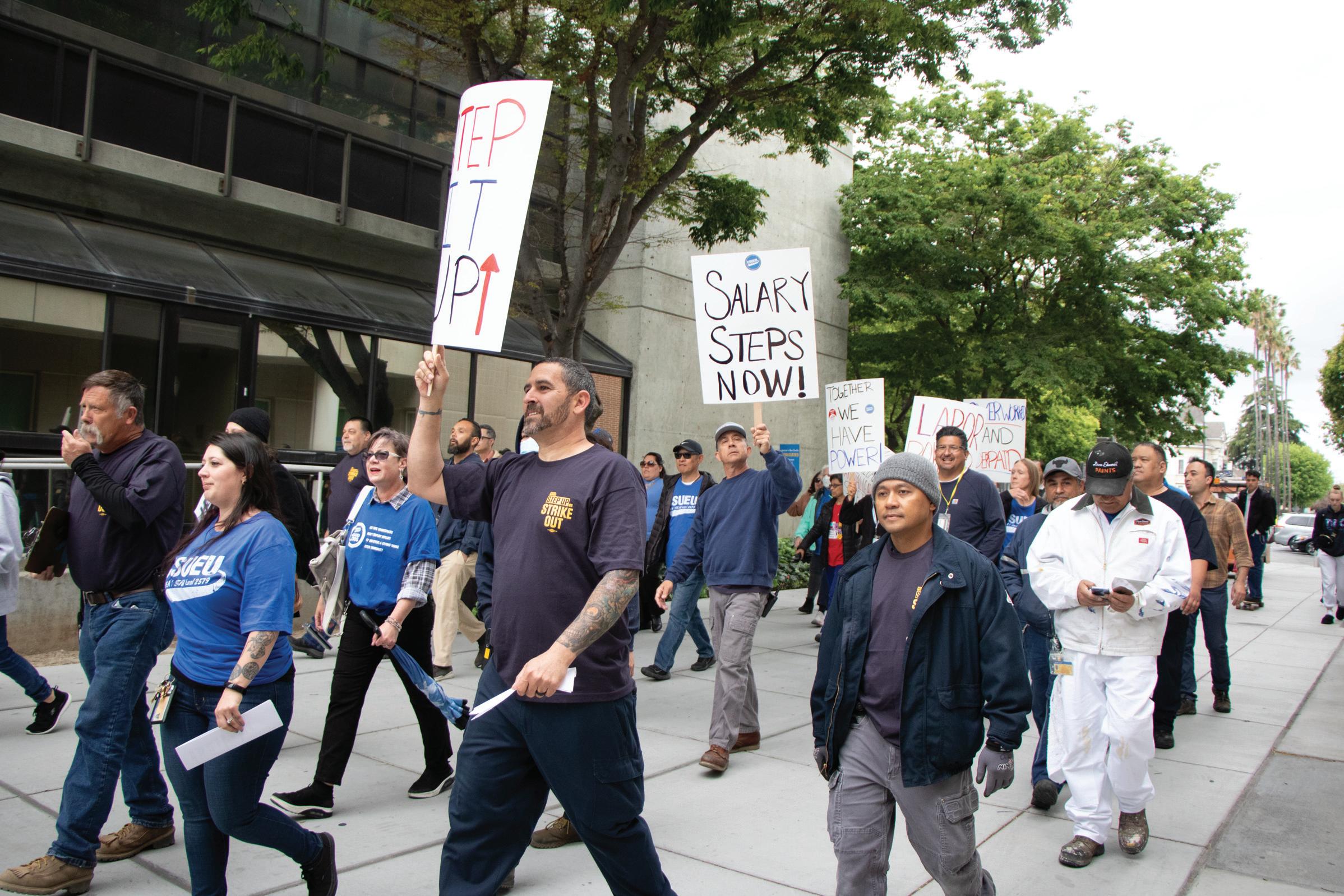
California State University Employees Union held a rally at San Jose State on Monday to commemorate Workers’ Day or International Workers’ Day.
The rally also served as a way for SJSU’s labor union to prepare their members to be strike ready in the future.
Members of the rally met at the Business Tower and marched together to Smith Carlos Lawn while chanting their demands from SJSU and the CSU as a whole.
Sarah Schraeder, vice president and chief steward for the CSUEU, said the association represents about 935 staff members on SJSU’s campus.
“We believe the CSU can’t run without the staff,” Schraeder said. “We’re the ones that do
AAPI alumni gather for SJSU reunion
By Brandon Nicolas STAFF WRITER
The Asian American Studies Founders Alumni Reunion took place last Friday evening in the Student Union to celebrate the history of Asian American studies, ethnic studies and the importance of the Asian American activists at San Jose State.
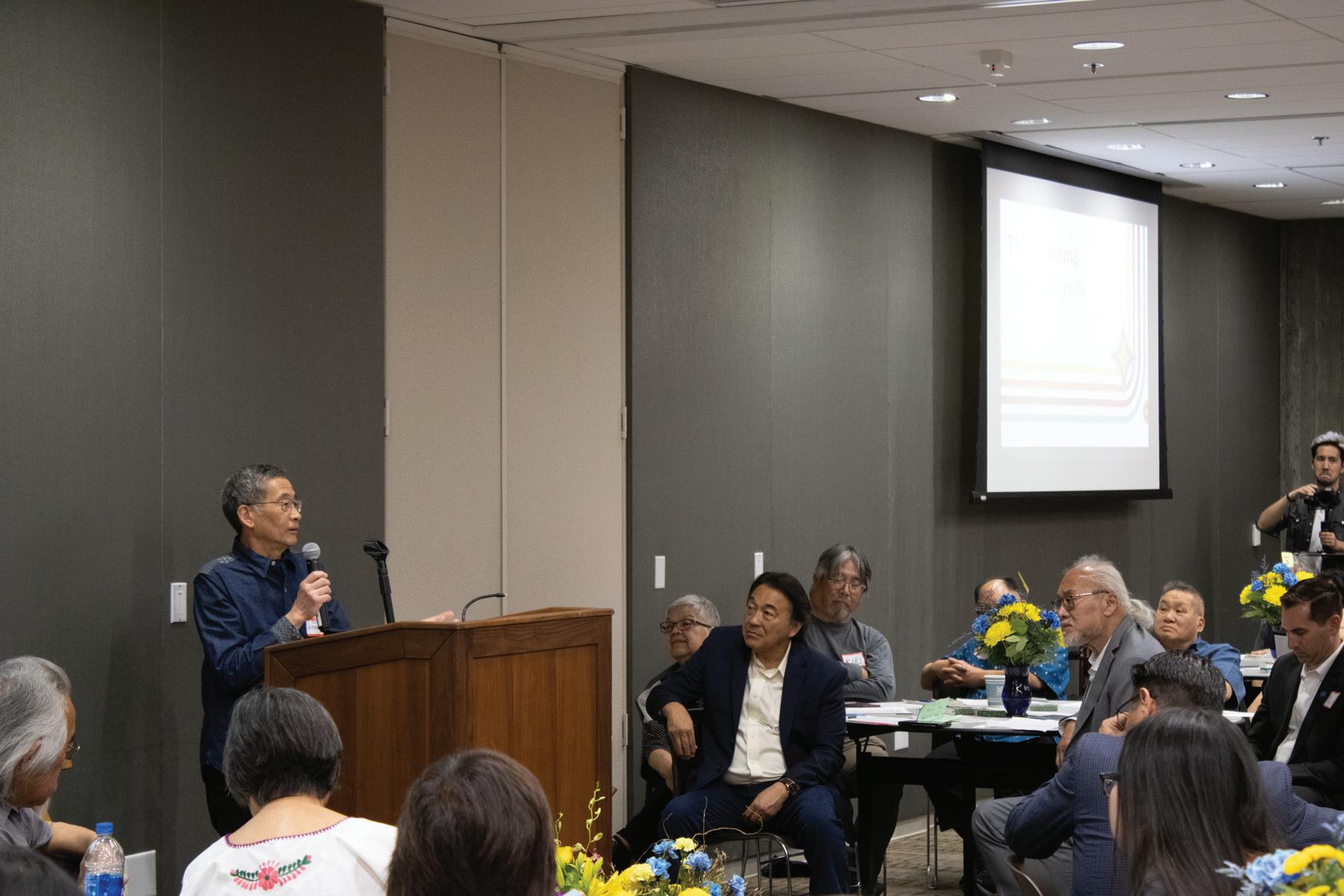
At the 7th Street Paseo Student Union entrance, the SJSU Lion Dancers performed for the returning alumni, faculty and staff as they mingled with familiar faces and old classmates.
To jump-start the reunion, assistant professor of Asian American studies Yvonne Kwan and Bay Area reporter Robert Handa, welcomed returning alumni to the event as they reminisced with familiar faces.
Alumna PJ Hirabayashi was the Asian American Studies Program Coordinator during ’77 to ’79, attended alongside her brother, alumnus Roy Hirabayashi, who performed a musical number with taikos, a Japanese percussion instrument.
“Today you will hear a collection of stories that will put a face to a movement that has changed, and continues to change, our national narrative,” said alumna Victoria Taketa. “One that will resonate with another who reads our story from a book.”
Taketa introduced Handa to speak about his time at SJSU.
“The student movement started happening, and I wanted to make sure that everything that we did in progress on this campus – we would not forget our responsibilities to the Asian American community,” he said.

Gesturing toward the tables of alumni, Handa said he recalls not seeing a face that looked like his on television.
During her time at SJSU, she said she was working on an urban planning thesis for San Jose’s Japantown involving its past and potential future.
“I was immersed in community work in Japantown and the development of San Jose Taiko, to find our voice and a cultural REUNION | Page 2
Transportation experts discuss human trafficking
Mineta Transportation Institute holds anti human trafficking webinar
By Rainier de Fort-Menares EXECUTIVE PRODUCER
For the 2023 Caltrans Safety Awareness Week, the Mineta Transportation Institute hosted a webinar on Thursday aiming to bring awareness to efforts from transit organizations to combat human trafficking in the United States
Human trafficking is the fastest growing organized crime that involves the recruitment, transport or transfer of people using force, fraud or coercion to exploit them for acts of labor, services or sex, according to a U.S. Department of Justice webpage. The webinar included five panelists who are professionals in the transportation field.
Human trafficking relies on transportation to move and recruit victims, making the transportation industry integral in preventing human trafficking.
Aston Greene, chief of system safety and security for the Santa Clara Valley Transportation Authority, said empowering transit users is crucial in increasing safety in transportation.
“We’ve all heard of the ‘See something, say something’ campaign, which I think is very important just to increase the awareness of your environment
while you’re on our transit,” Greene said. “But there is another thing that should happen right. It’s, ‘See something, say something,’ how about do something.”
Polly Hanson is the senior director of security, risk and emergency management at American Public Transportation Association and the former chief of police for Amtrak.
She said while she was working at Amtrak, she saw how effective human trafficking awareness training could be for staff.
“We know that wherever transit goes, communities grow and it’s only fitting then that your employees would want to help individuals be free from human trafficking in their communities,” Hanson said.
Kezban Yagci Sokat, San Jose State assistant professor of business analytics and research associate at the Mineta Transportation Institute, was one of the expert panelists for the webinar.
“The most important thing a regular citizen can do is . . . awareness, education, training,” Yagci Sokat said. “That was the most important thing.”
Greene said VTAlerts is an app that riders can use to support any observation of suspicious activity. The mobile app lets users write a short description of something they see, which is then sent to security and law enforcement.
“So [the VTA] armed the public with an ability to see something and do something immediately that could address what could be some threatening behaviors,” he said.
Volume 160 No. 38 Tuesday, May 2, 2023 SERVING SAN JOSE STATE UNIVERSITY SINCE 1934 WWW.SJSUNEWS.COM/SPARTAN_DAILY NAMED BEST CAMPUS NEWSPAPER IN CALIFORNIA FOR 2022 BY THE CALIFORNIA COLLEGE MEDIA ASSOCIATION
BRANDON NICOLAS | SPARTAN DAILY
SJSU alum Roy Hirabayashi shares stories from his time serving as the Asian American studies program director from ‘77 to ‘79 at an alumni reunion in the Student Union on Friday.
CHRISTINE TRAN | SPARTAN DAILY
SJSU staff walk from the Boccardo Business Center to the Olympic Black Power Statue to commemorate Workers’ Day on Monday.
RALLY | Page 2
TRANSPORTATION | Page 2
TRANSPORTATION
Continued from page 1
Yagci Sokat said her research examines the role of transportation in different stages of human trafficking in California.
In her research, she found that different transportation
RALLY
Continued from page 1
your schedules, we’re the ones that open the front doors of our department offices, we make sure the lights are on, the teamsters paint [and] maintenance or custodians clean the bathrooms. We represent all of the workers and if we shut it down, we will shut down the CSU.”
Many that attended the rally represented other labor unions, including the Academic Professionals of California, International Brotherhood of Teamsters and the Dominguez Hills chapter of the California Faculty Association.
Khanh Weinberg, SJSU alumna who works as the communications officer at CSU Employees Union, said the rally was the first May Day rally in many years on SJSU’s campus.
She said it’s great that SJSU employees feel energized because there is power in numbers.
“Many of the labor organizations are negotiating
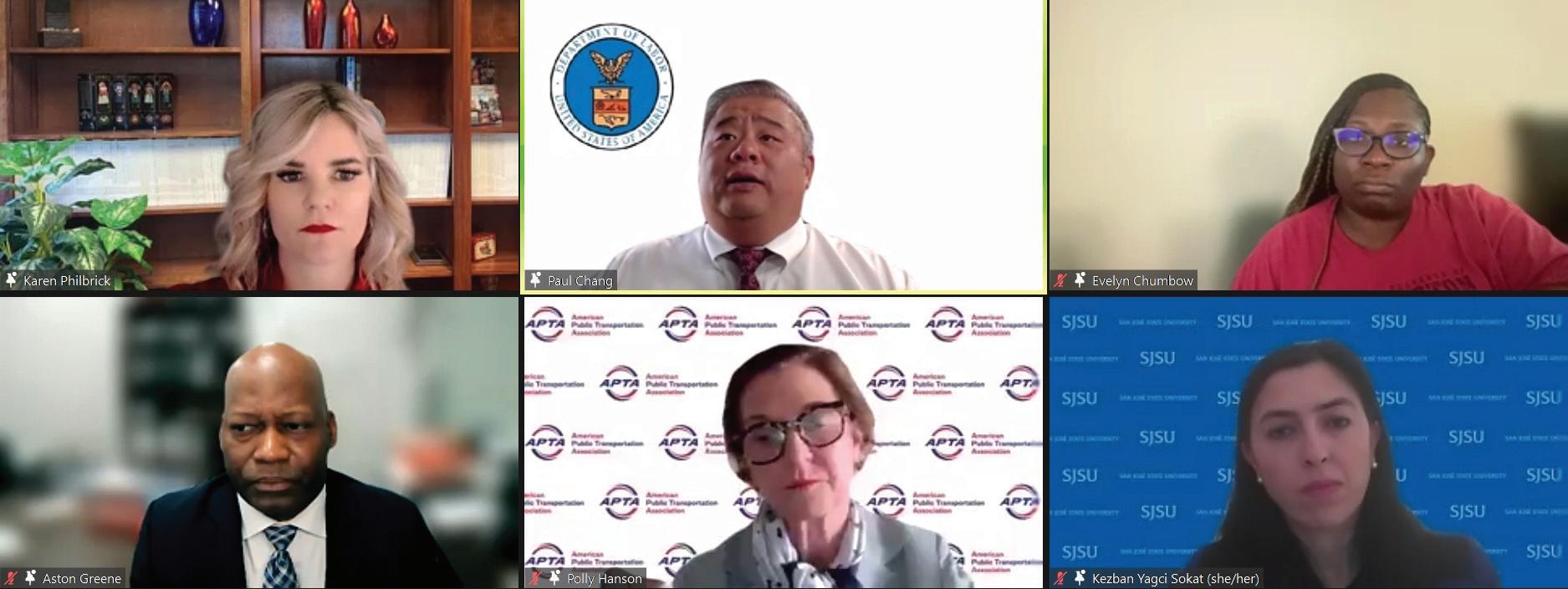
REUNION
Continued from page 1
expression through the taiko drum.”
PJ and Roy Hirabayashi were founding members of the San Jose Taiko group, a professional performing arts company that tours internationally, providing hundreds of concerts each year, according to the Discover Nikkei website.
“Here, locally, we saw the formation of organizations such as Asian American Community Involvement, Asian Law Alliance and so forth,” PJ Hirabayashi said. “This was really what was burgeoning in the community.”
Roy Hirabayashi said the early Asian American movements contributed to the change in ethnic studies education.
“I discovered there was a program that was starting up Asian American studies,” Roy Hirabayashi said. “When it started up in the fall of 1970, I jumped right into it,”
He said when he attended SJSU that fall, his agenda was to find out how, as a Japanese American, he can make a difference in his community.
“San Jose State was really in the middle of it all and
organizations working together to cross reference their data is another crucial role in combating human trafficking.
Paul Chang, regional antihuman trafficking coordinator for the U.S. Department of Labor, said partnership is essential in creating effective human trafficking task forces.
“There’s also an informal transportation industry that’s
right now with the CSU for contracts or contract reopeners,” Weinberg said. “We’re saying that as support workers who support students and help students thrive on campuses, that the CSU administration must not forget its support workers who are providing frontline and vital services to our students.”
Janet Sundrud is an operations and systems senior analyst at SJSU and a representative steward at large for SJSU’s chapter in the CSU Employees Union.
Stewards are volunteers who support the CSU Employees Union, according to its webpage.
Sundrud said she has worked on campus for almost 20 years, starting as a part-time research assistant, and acknowledged that everyone who works for the university is committed to their respective roles.
“We want to deliver the best experience for our students, but we also need a living wage,” Sundrud said. “We need to survive in this expensive Silicon Valley and so we’re here to advocate for steps so that we
although we weren’t really recognized for that, there was so much happening here,” Roy Hirabayashi said.
Former Asian American studies assistant professor Greg Mark met Roy Hirabayashi during an interview at SJSU.
“We did things that were pretty amazing,” Mark said.
“One thing that we did was we
really not looked at in many cases,” Chang said. He said immigrant communities are more likely to use informal forms of transportation, including underground versions of Uber.
“Traffickers learn and adapt so we as the people who are trying to combat human trafficking have to adapt ourselves,” Yagci Sokat said. “We make sure that we learn
all can be an institution where we’re paid fairly.”
The CSU salary system allowed its employees to receive increased salaries through 5% annual steps to progress from the bottom step to the top step, according to a CSUEU webpage.
In 1996, CSU trustees removed the steps proposal from the union contract, so many CSU employees are still in the lower salary range despite having their position for years or decades, according to the same CSUEU webpage.
Sundrud said she joined the labor union because she empathizes with those who have worked with poor management.
“The Union can help me to step in and support employees when they find themselves in a bad work environment with an unsupportive manager,” Sundrud said.
As a representative steward, she said she advocates for her co-workers in her direct unit.
“I can help clarify the union contract and I can help intercede and navigate difficult work environments as they come up,” Sundrud said.
across the Bay Area came together to form the Third World Liberation Front to demand the university acknowledge the histories of communities of color, according to the Berkeley Center for Race and Gender website.
“I think it’s important for the students today to remember this, ‘Thanks for your interest
from our survivors, when we are doing any of these efforts so that they’re actually meaningful and appropriate.”
Evelyn Chumbow, operations manager for Human Trafficking Legal Center, is a survivor of child labor trafficking and an anti-human trafficking advocate.
“Training is important but make sure you’re getting this training from a diverse pool of
Schraeder, who currently works as a research associate and program coordinator, said it’s unfair that newer people get hired into higher salary ranges, but CSU employees who have worked for decades are stuck with the same salary.
“We have a huge turnover problem in staff,” Shraeder said. “President [Teniente Matson] in her January address mentioned that [SJSU’s] retention of staff got worse by 70%. It went from we’re only retaining 11.2% to we’re not retaining 19% so that means almost 20% of the staff that you see working here and out, 20% of them will be gone by the next academic year.”
Schrader said the CSU Employees Union is also working on organizing student workers to negotiate for better raises and better salaries.
“They’re unionizing cards and now we filed them with PERB, which is a state personnel board,” she said. “We have 20 days for them to decide, yes, you have enough union cards compared to the amount of student workers that exist in the system for them to make a
into the seats because Asian American studies was not being supported or provided the resources, and therefore, those who came before me decided that we are going to make sure that we exist by simply making sure we have students in the seats,” Do said.
He said this deliberate act resulted in a competition between Asian American studies and other departments on campus.
“It made it so that we were forced, in some ways, to cover things that we had to cover –not the things that we want to cover,” Do said. “That was an issue.”
He said after requesting Asian American studies reach department status, the institution vetoed their request because of the lack of faculty.
people [with] live experience,” Chumbow said. “I like to use my experience. I came here at age 9 and I got on the plane . . . [I was with] my trafficker and I seemed like a very happy kid so sometimes the signs might be different.”
Follow
vote to unionize.”
The Public Employment Relations Board is responsible for administering bargaining statutes for employees in California including colleges and universities, according to its website.
Shraeder said the CSU gave the Employees Union salary steps proposal with 23 steps so it would take 23 years for employees to move through their range, which they find unfair.
Schraeder said when the union is ready to file to strike, SJSU employees will walk off their jobs and have no pay until an agreement is made about the money they need.
“It makes no sense,” Schraeder said. “It was a slap in the face proposal, so what we’re doing now is getting strike ready.”
organizer at the Center for Asian Pacific Islander Student Empowerment.
“The reason why I pursue forensic biology and Asian American studies together is to understand the impacts of over-policing, mass incarceration and deportation of API communities, especially southeast Asian refugees like my own,” Le said.
Biomedical Engineering sophomore Tida Ngov minors in Asian American studies and discussed the lack of ethnic studies involving community outreach and community building.
took over the president’s office.”
Aside from participating in a student picket line in the spring of 1975 that involved surrounding the former SJSU President John H. Bunzel’s office, Mark said he also took part in the Third World Liberation Front strikes of 1968.
The World Liberation Front strikes of 1968 at UC Berkeley occurred when students from
in supporting us, but you don’t tell us what to do,’” Mark said.
“We decide what we want to do, and you can support us.”
Hien Do, professor of Asian American studies at SJSU, said he came to the university 30 years ago as an idealistic faculty member who was committed to the idea of Asian American studies.
“We wanted to get students
“All of us were teaching these GE classes and we couldn’t do that,” Do said. “I observed that there was a lack of knowledge and understanding from the institution.”
Afterward, a couple Asian American students took to the podium to share their experiences and goals for their futures.
Kayla Le, forensic studies sophomore minoring in Asian American studies, is a second-generation Vietnamese immigrant and a community
“It was great seeing so many of the people who were pioneers in making sure the Asian American studies program got on its feet,” Handa said. “One of the inspiring things about today’s event was the student leaders who came forward to talk about the future and how they plan to be involved.”
sjsunews.com/spartan_daily TUESDAY, MAY 2, 2023 NEWS 2
SCREENSHOT BY RAINIER DE FORT-MENARES | SPARTAN DAILY
the Spartan Daily on Twitter
Follow
@SpartanDaily
Follow the Spartan Daily on Twitter @SpartanDaily
Rainier on Twitter @demenares
The student movement started happening, and I wanted to make sure that everything that we did in progress on this campus – we would not forget our responsibilities to the Asian American community.
Robert Handa Bay Area reporter
SJSU recognizes student researchers
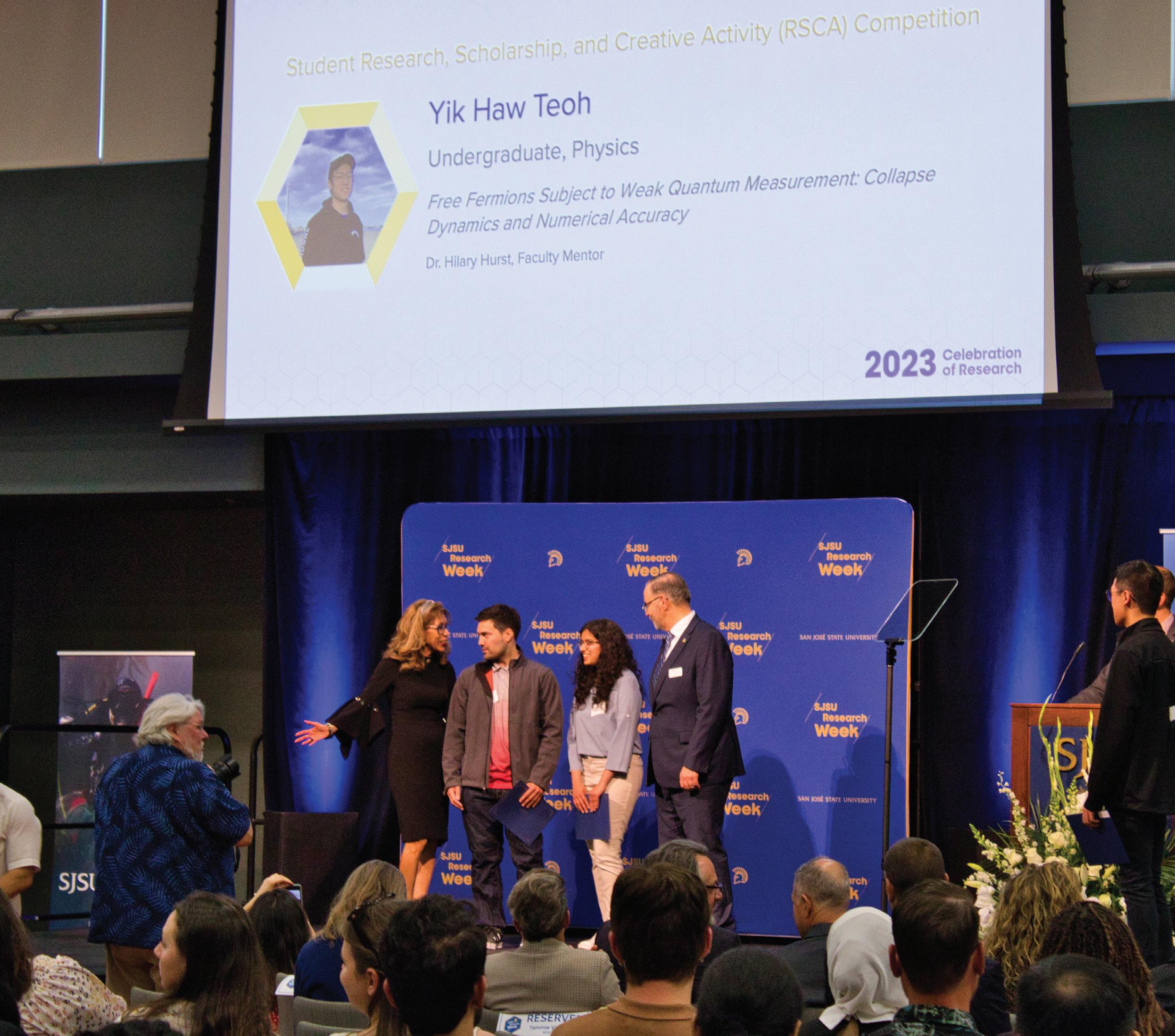 By Brandon Nicolas STAFF WRITER
By Brandon Nicolas STAFF WRITER
San Jose State University’s Celebration of Research was the capstone event to the institution’s research week, taking place on Thursday at the Student Union, highlighting student work, start-up innovation showcases, research competitions and more. The event held an awards ceremony including student researchers from the RSCA Opportunities for Graduate Students, Undergraduate Research Opportunity Program, SJSU Student RSCA Competition and the McNair Scholars Program.
Mohamed Abousalem, vice president for Research and Innovation, introduced the event.
“Through the great research work that our faculty and students do, we are able to contribute to solving today’s problems and mitigate tomorrow’s challenges alongside our industry and community partners,” Abousalem said. “This celebration today is our way of demonstrating our unique ability to perform critical research work on important topics and develop creative scholarships in areas that touch our lives.”
Afterward, Abousalem introduced Vincent Del Casino Jr., provost and senior vice president for academic affairs.
Casino said it was not only growth in student research that he’s seen over the past four years, but the integration of that growth feeding into the teaching and learning enterprise.
“This valley is incredible and it is also marked by incredible amounts of inequity,” Casino said. “The faculty, the staff and the students are committed to thinking about that, and the Research, Scholarship and Creative Activity enterprise can drive that change and transformation, not just on this campus, but in this valley and in the world.”
Environmental studies Lily Law is a master’s student in the RSCA program and showcased her master’s thesis on soil microbial communities in the grasslands of Montara, Calif.
A microbe, or microorganism, is a very small life form that cannot be seen without the help of a microscope, and can be classified as fungi, bacteria, archaea, protozoa or virus, according to an eOrganic webpage.
“Once we receive the
fellowship, we have a meeting once a month to talk about our project, but also how to conduct research,” Law said. “It’s a really good support system.”
Alongside assistant professor Metha Klock, Law’s research delved into the effects of how invasive trees are encroaching into the grasslands, in turn changing the soil microbes of the grassland community.
“When I first started looking for different projects to study as a master’s student, I was initially thinking of doing invasive species, but not in the microbial sense,” Law said. “Once I visited this site in Montara, I saw how trees are encroaching onto this grassland and I thought, ‘Yes, I see what’s happening on the ground, but what’s happening beneath?’”
She said the importance of what lies beneath grasslands is more important than what can be seen above the soil.
“We are opening doors for new researchers and as a result, we are producing research that is actually applicable in real world knowledge,” President Cynthia Teniente-Matson said. “The research and innovation that we are producing here –
Mohamed said it – its public impact.”
Richard Mocarski, associate vice president of the SJSU Division of Research and Innovation, started the awards ceremony by introducing the Student Research Competition winners.
The Student Research Competition is an annual event that allows graduate and undergraduate students to present their original research and creative activity. Those selected will represent SJSU at the annual CSUStudent Research Competition.
The grant for the Student RSCA Fellowship Awards allocates student researchers a fund of $2,000 per semester.
Afterward, three students would be awarded for their research presentations during the Grad Slam that took place on Tuesday.
The Grad Slam is a research communication competition where graduate students present a three-minute thesis about their findings.
Competing in front of a live audience and a panel of judges, students were scored on their ability to communicate their work and its impact effectively in a short amount of time.
Biological sciences
graduate student Jaedyn Rollins won first place in the Slam.
Her research included mentorship from biology professor Jennifer Johnston.
“I am basically looking for DNA location that can be safe for gene insertion as a way to correct or cure monogenic disorders,” Rollins said.
A monogenic disorder is an inherited disease controlled by a single pair of genes, according to the Webster-Dictionary webpage.
Rollins said she began working on the project in continuation with Johnston after the research was presented in lab.
“This project basically entails how with monogenic disorders, they are disorders in which a single gene is not functional,” Rollins said.
“For example, hemophilia
A is a bleeding disorder in a gene is dysfunctional . . . if we were to insert a healthy version of that gene into the DNA of this individual, they could be cured, but you cannot insert a gene anywhere in the DNA – you need a safe location.”
She said, if a gene were to be inserted in an unsafe location, the results could affect genes that have important functions or even lead to cancer.
“It’s just so interesting hearing what other research is being done here on campus, especially outside of the Department of Biological Sciences,” Rollins said. “I only ever hear about bioresearch, and so it’s cool to hear about business and linguistics.”
Social work freshman Lesley Cortes worked with assistant professor Vicky
Correction
Gomez to understand the role of digital storytelling as a community health promotion tool in Latinx communities to address cancer health disparities.
“What inspired me to work on this research is because as a first generation Latina, I wanted to work with my community and find ways I can help them through stories,” she said.
On Thursday the Spartan Daily published an article titled, “Police response dictated by 1967 law” in which we misrepresented the Disability Rights California.
For clarity, the Disability Rights California is a nonprofit organization and not a federal agency.
The Spartan Daily regrets this error.
sjsunews.com/spartan_daily TUESDAY, MAY 2, 2023 SCIENCE & TECH 3 EDITORIAL STAFF EXECUTIVE EDITOR NATHAN CANILAO MANAGING EDITOR ALESSIO CAVALCA ASSOCIATE EDITOR BOJANA CVIJIC EXECUTIVE PRODUCER RAINIER DE FORT-MENARES A&E EDITOR VANESSA TRAN OPINION EDITOR JILLIAN DARNELL SOCIAL MEDIA EDITOR BRYANNA BARTLETT CONTACT US EDITORIAL –MAIN TELEPHONE: (408) 924-3821 EMAIL: spartandaily@gmail.com ADVERTISING –TELEPHONE: 408-924-3240 ADVERTISING STAFF ADVERTISING DIRECTOR MIA WICKS CREATIVE DIRECTOR BRIANNE BADIOLA ABOUT The Spartan Daily prides itself on being the San Jose State community’s top news source. New issues are published every Tuesday, Wednesday and Thursday throughout the academic year and online content updated daily. The Spartan Daily is written and published by San Jose State students as an expression of their First Amendment rights. Reader feedback may be submitted as letters to the editor or online comments. PHOTO EDITOR ALEXIA FREDERICKSON COPY EDITORS CHRISTOPHER NGUYEN HAILEY FARGO GRAPHICS EDITORS HANNAH GREGORIC JANANI JAGANNATHAN MYENN RAHNOMA SENIOR STAFF WRITERS ADRIAN PEREDA JEREMY MARTIN OSCAR FRIAS-RIVERA STAFF WRITERS ALINA TA BRANDON NICOLAS CHRISTINE TRAN DYLAN NEWMAN DOMINIQUE HUBER ENRIQUE GUTIERREZ-SEVILLA MAT BEJARANO MATTHEW GONZALEZ PRODUCTION CHIEF MIKE CORPOS NEWS ADVISER RICHARD CRAIG EMAIL: spartandailyadvertising@gmail.com CORRECTIONS POLICY The Spartan Daily corrects all significant errors that are brought to our attention. If you suspect we have made such an error, please send an email to spartandaily@gmail.com. EDITORIAL POLICY Columns are the opinion of individual writers and not that of the Spartan Daily. Editorials reflect the majority opinion of the Editorial Board, which is made up of student editors.
BRANDON NICOLAS| SPARTAN DAILY
Finalists for the Student RSCA Competition go on stage to recieve an award for SJSU’s Celebration of Research in the Student Union on Thursday.
Follow the Spartan Daily on Twitter @SpartanDaily
SJSU experts present their research
By Mat Bejarano STAFF WRITER
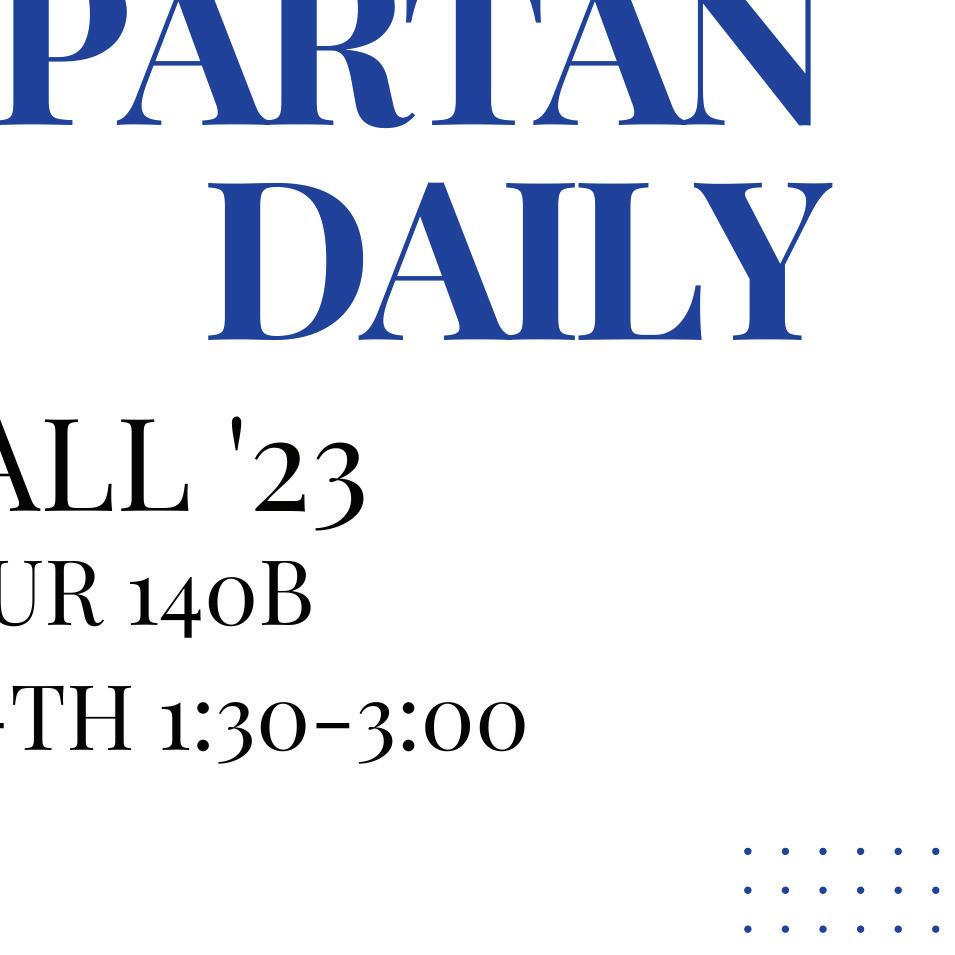
Faculty presented their research in the penultimate event of San Jose State’s research week in the as a part of RSCA in five events last Friday afternoon.
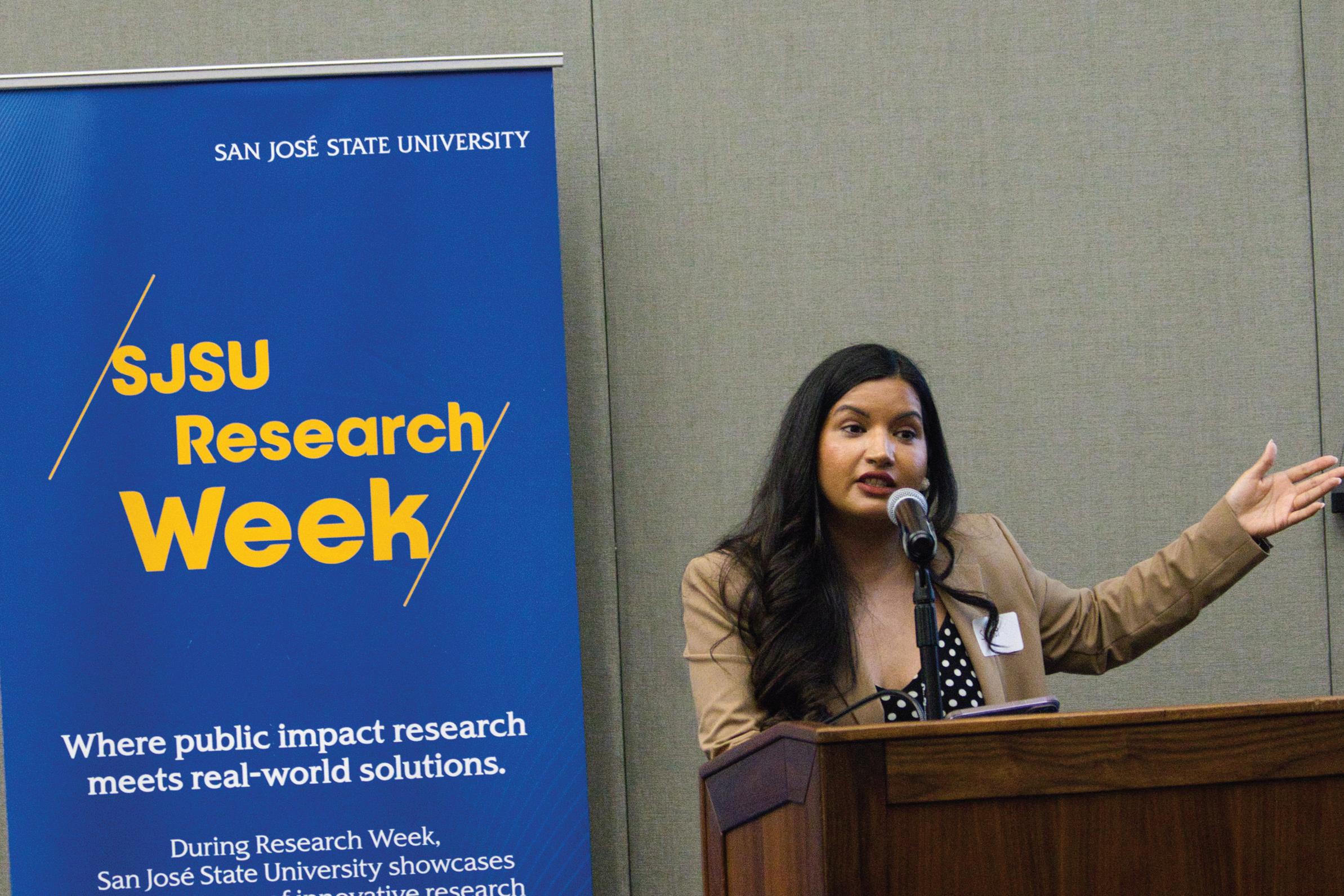
The event had participants showcase their studies in five slides in five minutes.
Lauren Lee, project and communications coordinator of the office of research said the planning process for the event was long.
“I would say the difficulty is just the fact that since this was something that hadn’t been done before,” Lee said. “We had to do a lot of things like create the banners, design the artwork, make sure that all of the different faculties on campus were aware of this happening.”
She said seeing the events different colleges held was interesting and hopes to continue sharing their analyses.
“Research Week was this cool thing where we could go and we could talk to the different colleges and departments and figure out who was doing what, what time where and when, and we could coordinate and create a whole week of events,” Lee said.
She said one of the cool things about SJSU is their focus on undergraduate research.
“I always had this impression that you have to be in a master’s program or you have to be a PhD student to be able to conduct your research,” Lee said.
“But I think with SJSU it’s really cool because it’s very eye opening and very welcoming, which I think SJSU does a really good job at doing that and making sure underrepresented or minority students who haven’t ever thought about doing
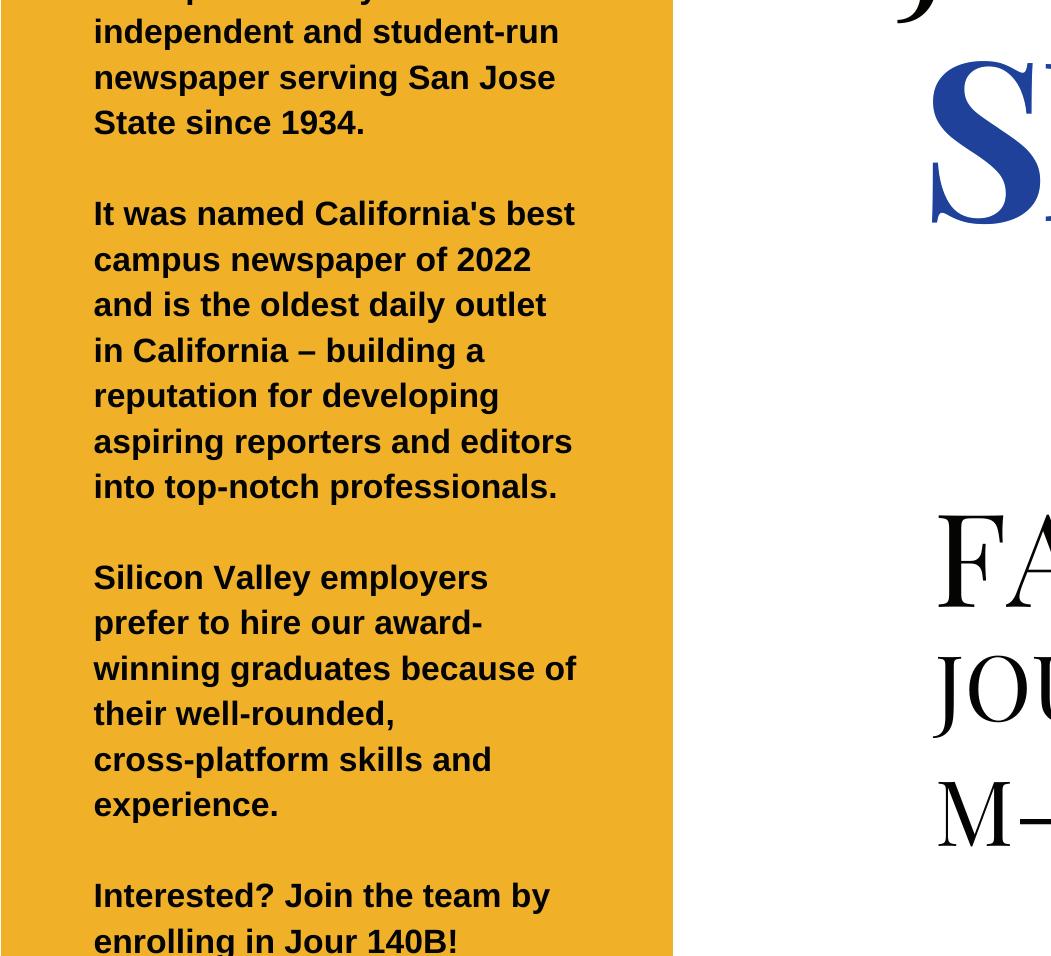

research have had a chance to be exposed and to think about those steps and feel important.”

SJSU assistant engineering professor Mojtaba Sharifi presented his research on the design and fabrication of wearable robotic tech that can help those who are rehabilitating an injury.
Shafiri said he wanted to share his research with faculty members from different departments.
“So there are a lot of regulations, but I think at the end of the day, we want to make these devices very comfortable and easy to use,” Sharifi said.
“And [we want] people to use
them in their home, rather than working in a clinic.”
He said he previously presented his research during last semester’s RSCA event and had an easier time preparing his presentation this time around.
“I like that people come from different fields and they can look at it from different lenses,” Sharifi said.
Supreet Kaur, Lead Systems Engineer for the Data & Reasoning Fabric team at NASA Ames Research Center and San Jose State Alumni, said it was important to have her research presented.
“I think people need to know
that the research that is done here does have an impact,” Kaur said.
She said she credits her former professor, Dan Robert, for letting her volunteer on graduate students’ projects that helped kick start her career.
“I found that to be an incredibly rewarding experience,” Kaur said. “It was volunteer work but it taught me a lot about human factors as well as system engineering and that’s what helped land me my first internship at NASA.”
Kaur said it was important for her to return and showcase her findings at her alma mater because she remembers being a
student and listening to other presenters gauge her career path.
“But it’s really important for me to come back and show that the work that we’ve done here at San Jose State does translate to the real world outside and it does have an impact on my life as a graduate,” Kaur said. “I just want to be able to share with other students that you never know where you’re going to end up.”
sjsunews.com/spartan_daily TUESDAY, MAY 2, 2023 SCIENCE & TECH 4
MAT BEJARANO | SPARTAN DAILY
Supreet Kaur discusses her work as the lead system engineer for the data and reasoning fabric team at the NASA Ames Research Center.
the Spartan Daily on Twitter @SpartanDaily
Follow


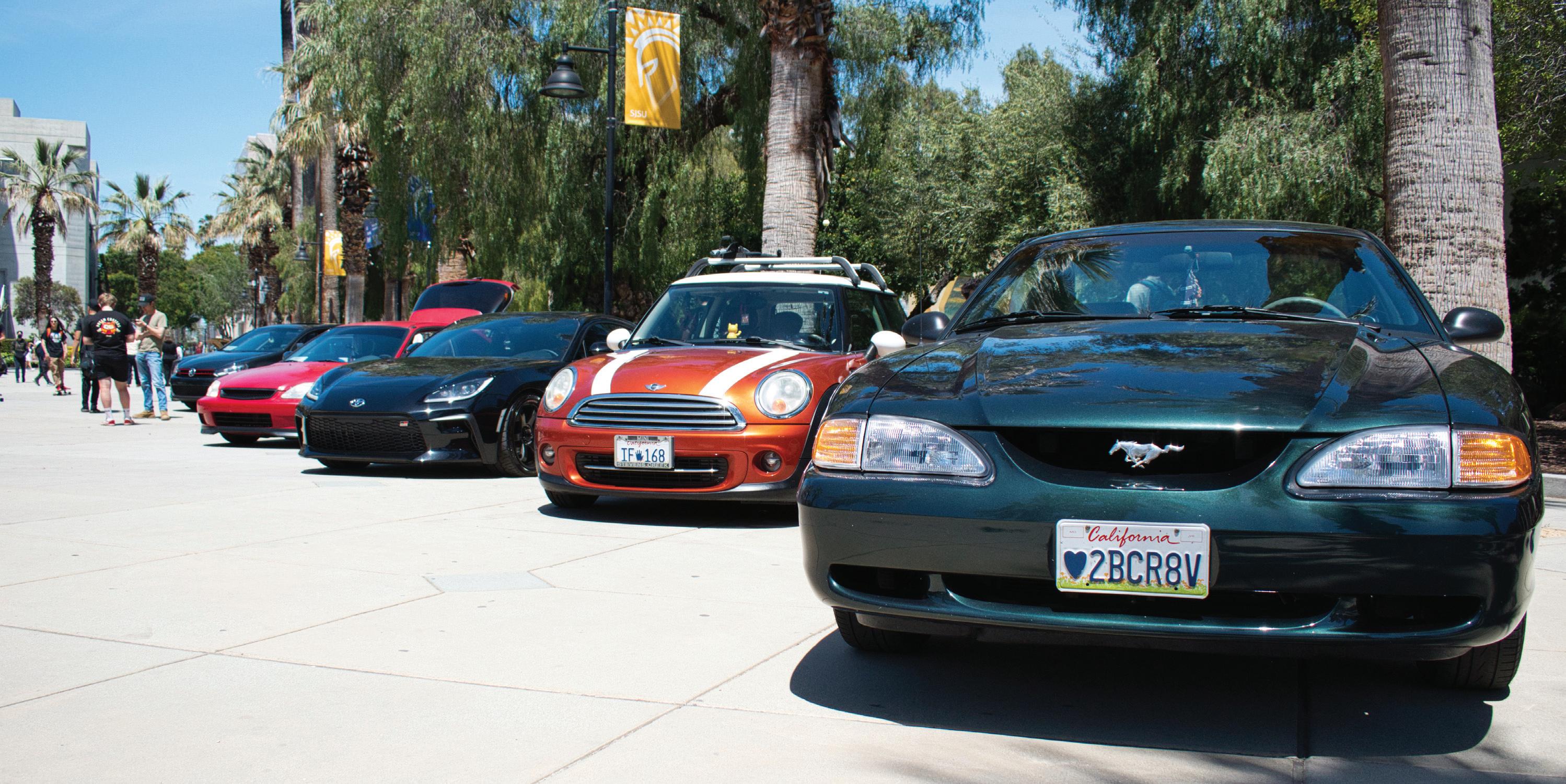
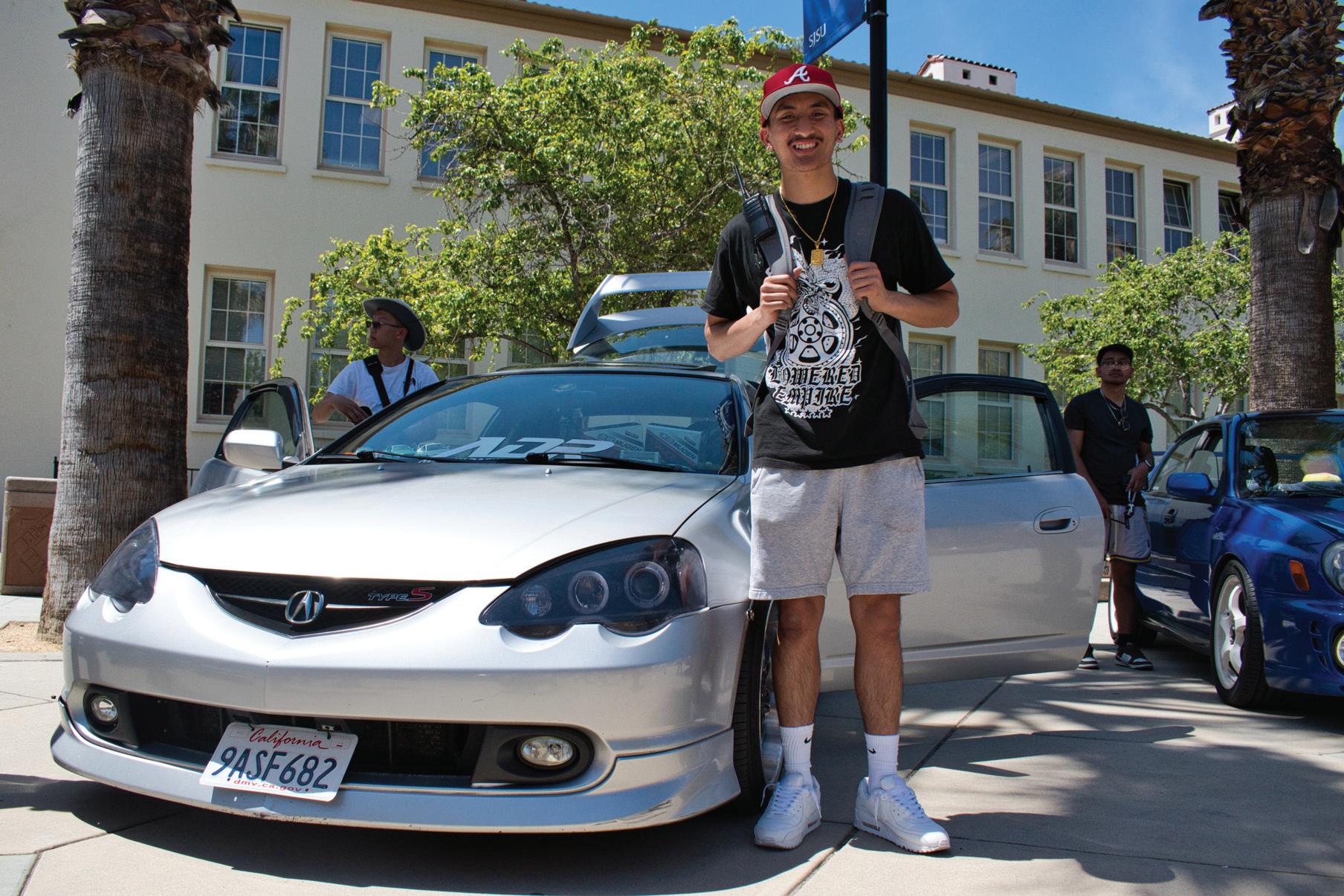
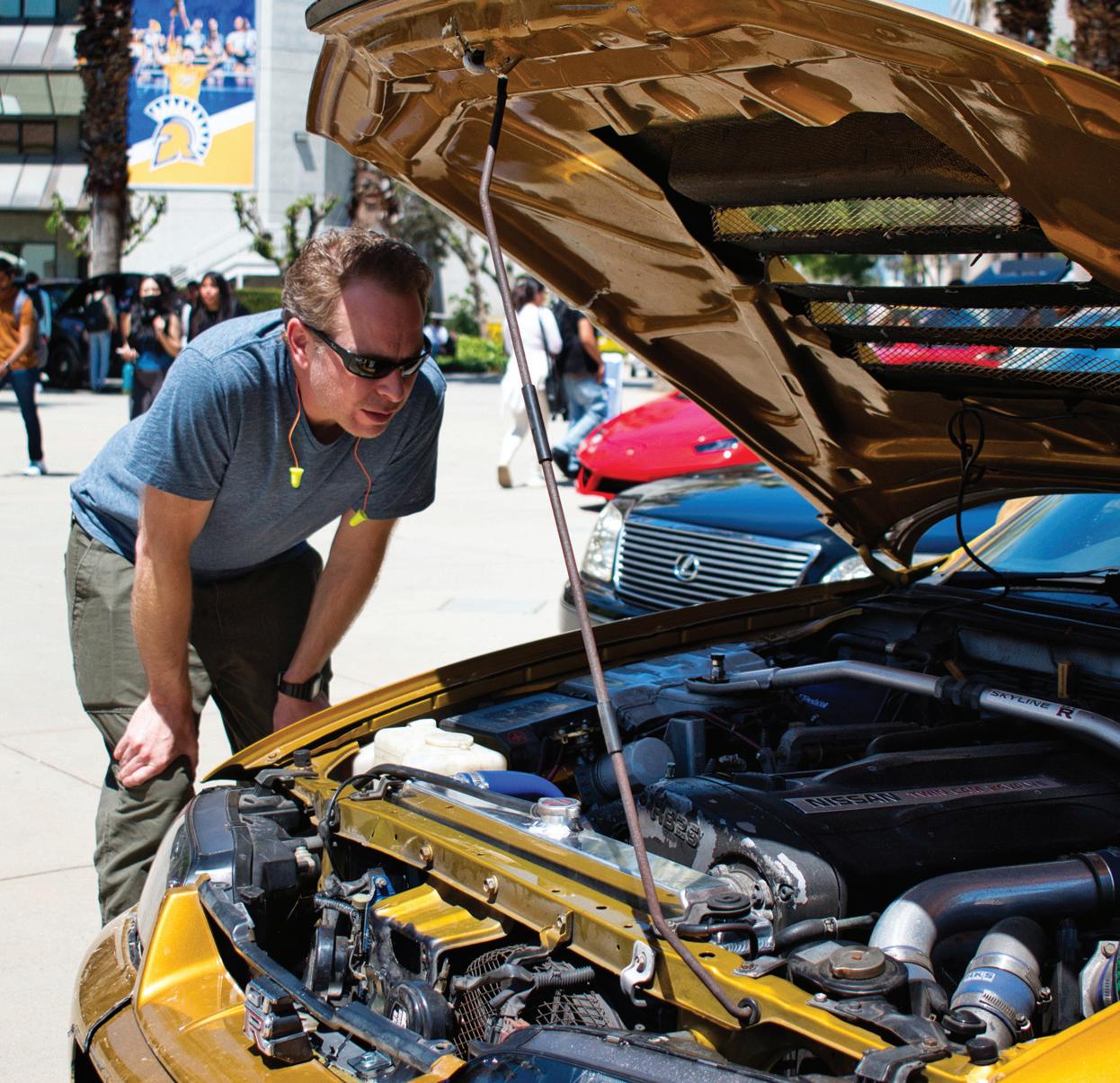
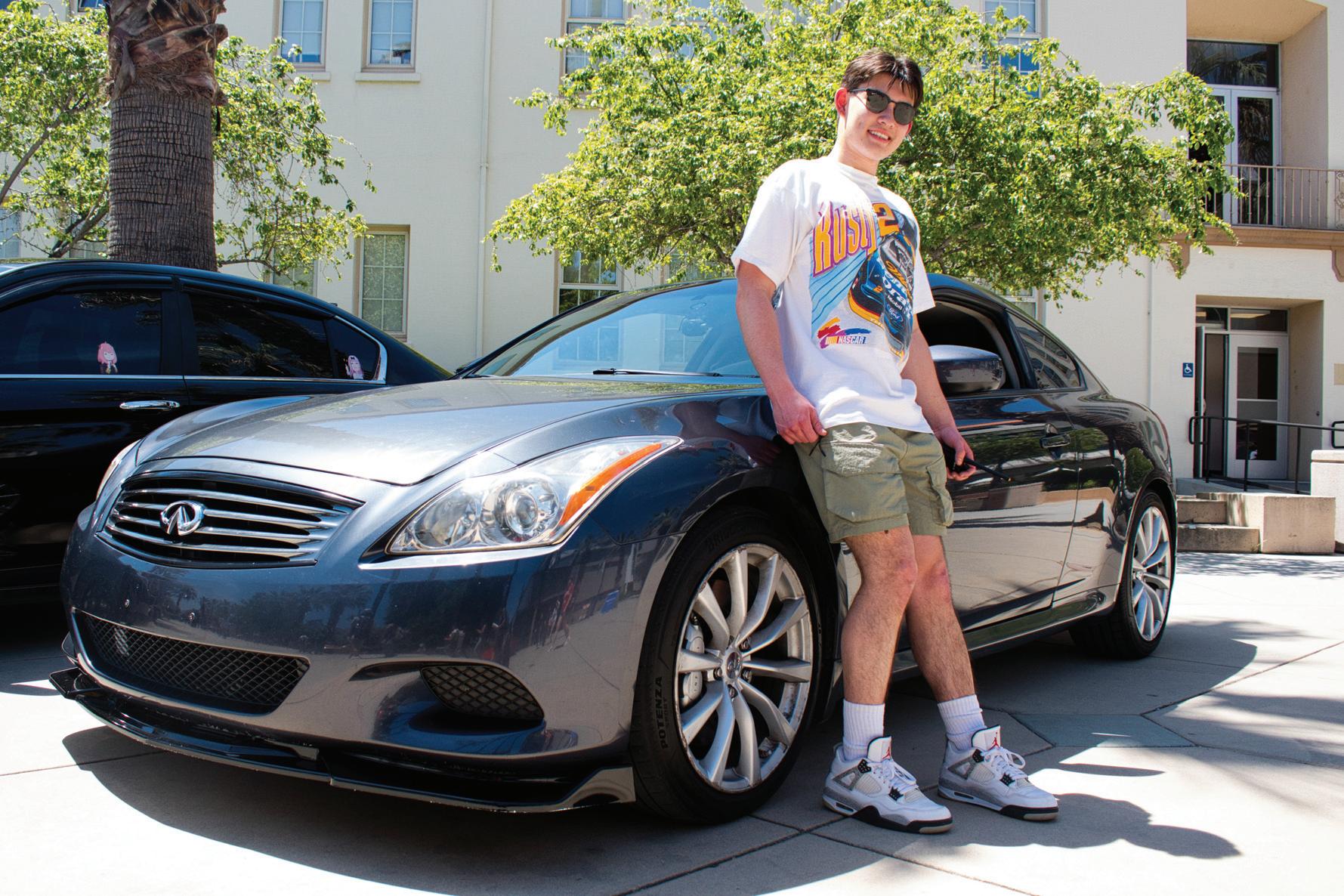
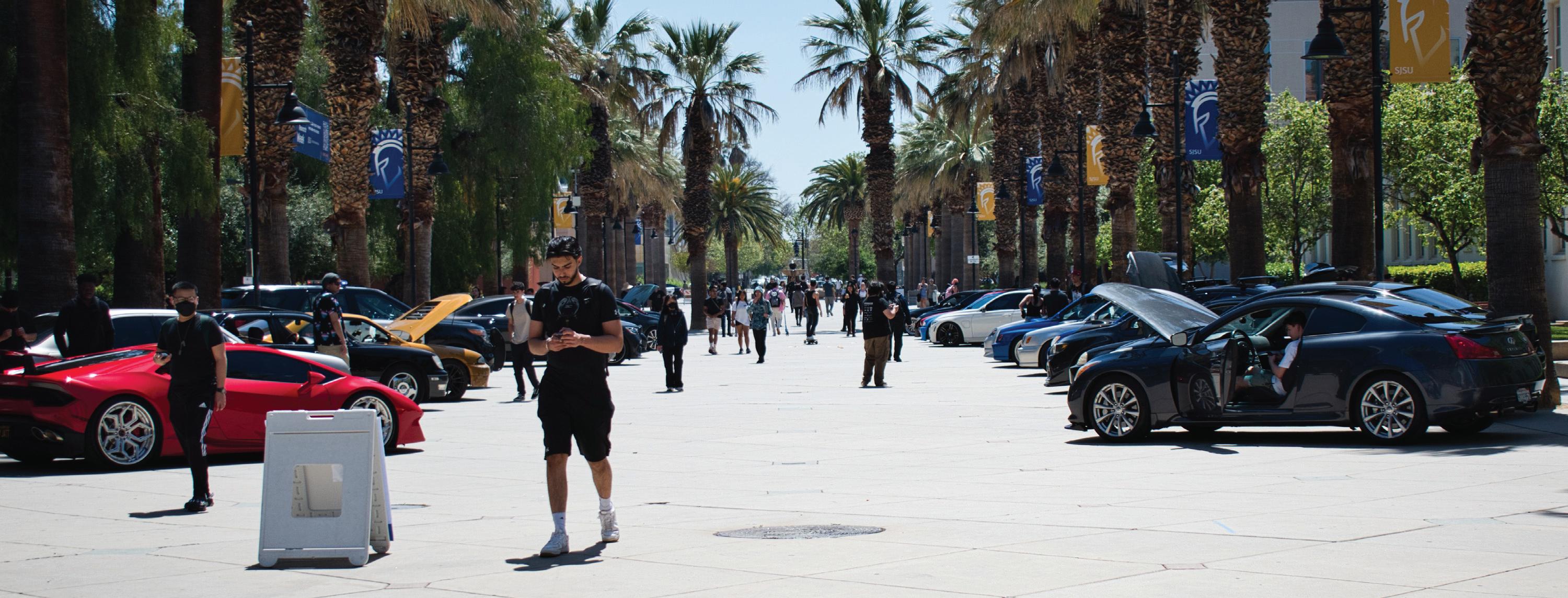
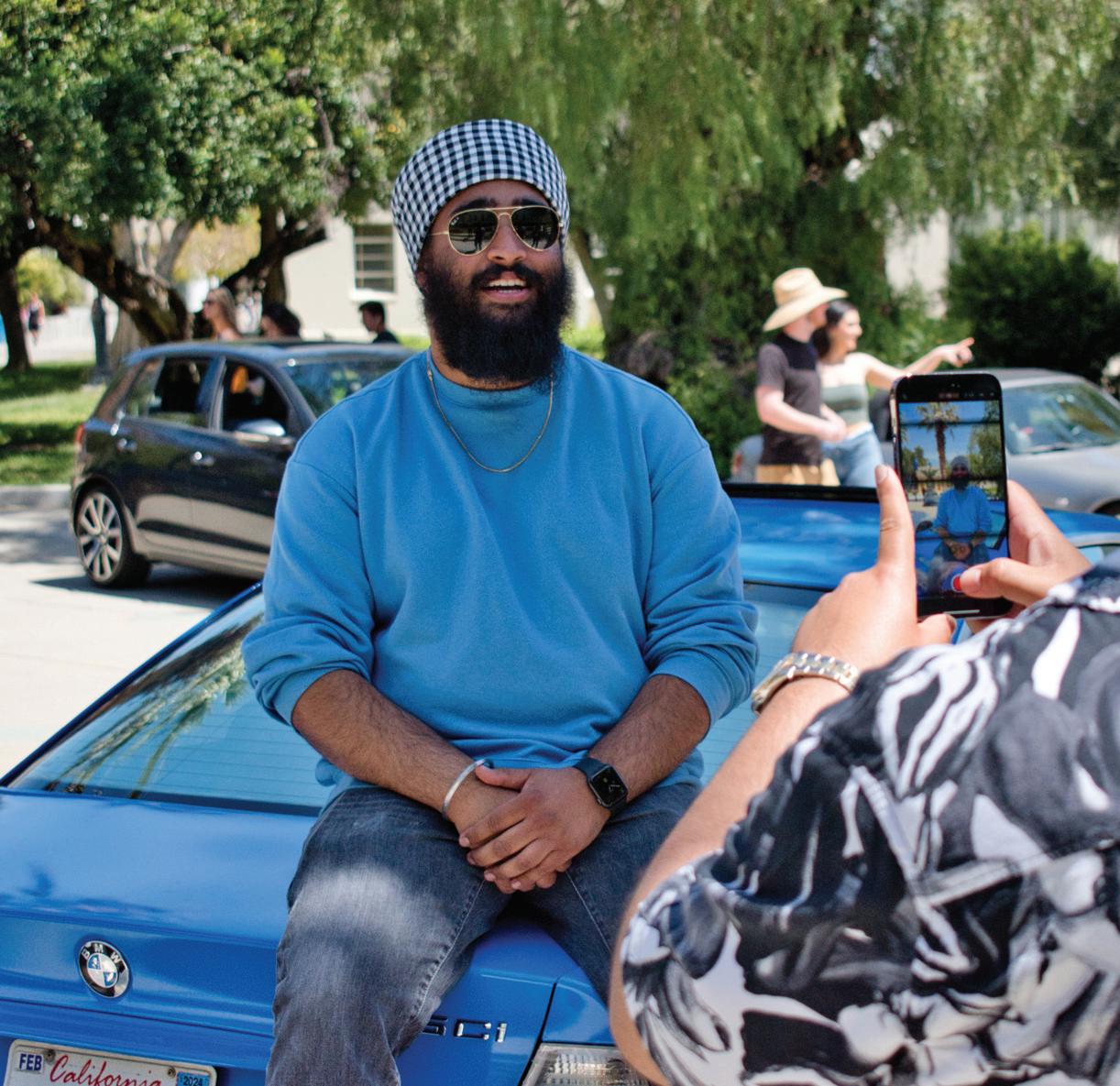
sjsunews.com/spartan_daily TUESDAY, MAY 2, 2023 ARTS & ENTERTAINMENT 5 SJSU wheels in car enthusiasts 1: Spartan Automotive Enthusiasts and San Jose State’s Police Department collaborated to put on a car show on Seventh Street Plaza on Thursday afternoon. 2: Lab tech at the Art Building, Jordan Shepard, looks under the hood of a Nissan GTR Skyline. 3: Mechanical engineering freshman Armani Pann shows off his 2004 Acura RSX Type S. 4: Logan Meline, Spartan Automotive Enthusiasts Club’s event coordinator and business senior, stands in front of his 2008 Infiniti 639 Sport Coupe. 5: Tejinder Lamba, business administration, management information systems junior, sits on the trunk of his 2002 BMW 325Ci. 6: Members from Spartan Automotive Enthusiasts Club and SJSU’s Police Department line up their cars on both sides of Seventh Street Plaza. PHOTOS BY ALINA TA | SPARTAN DAILY 1 2 3 4 6 5
Rappers light up SpartanFest
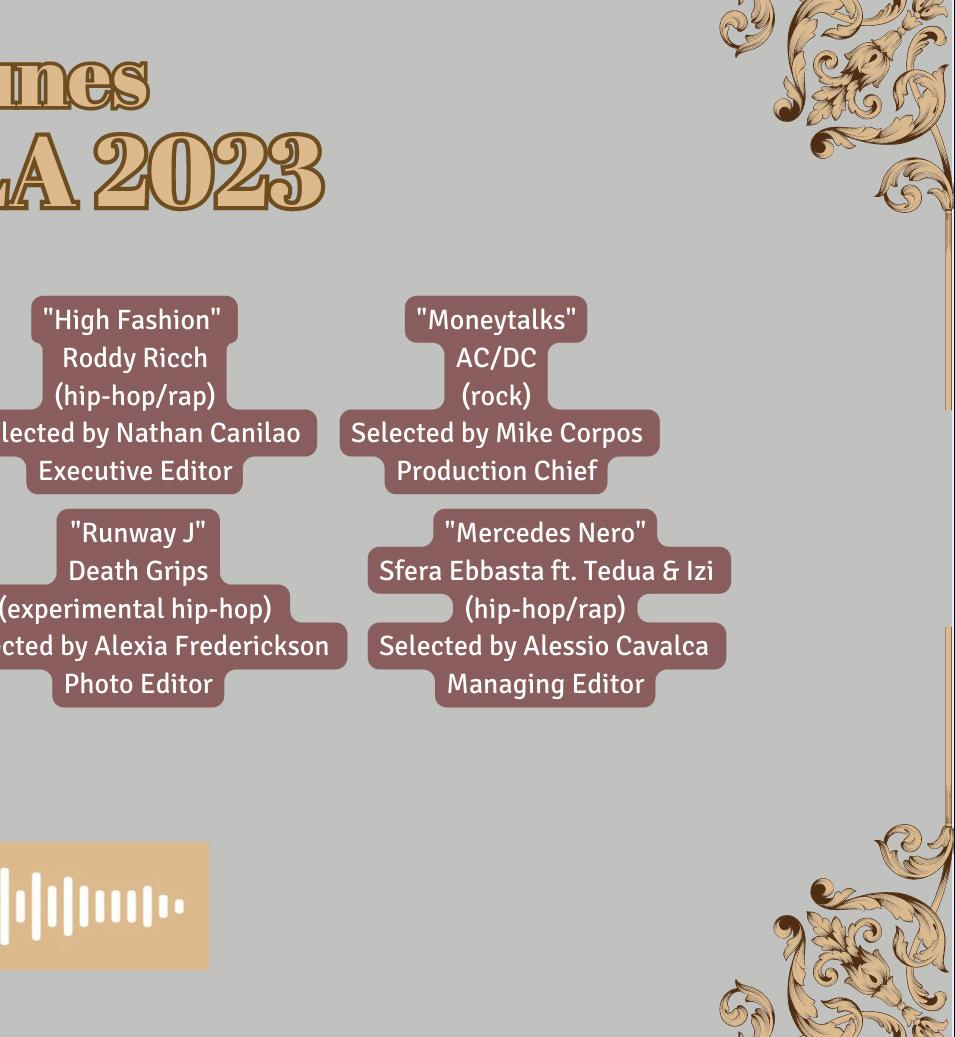
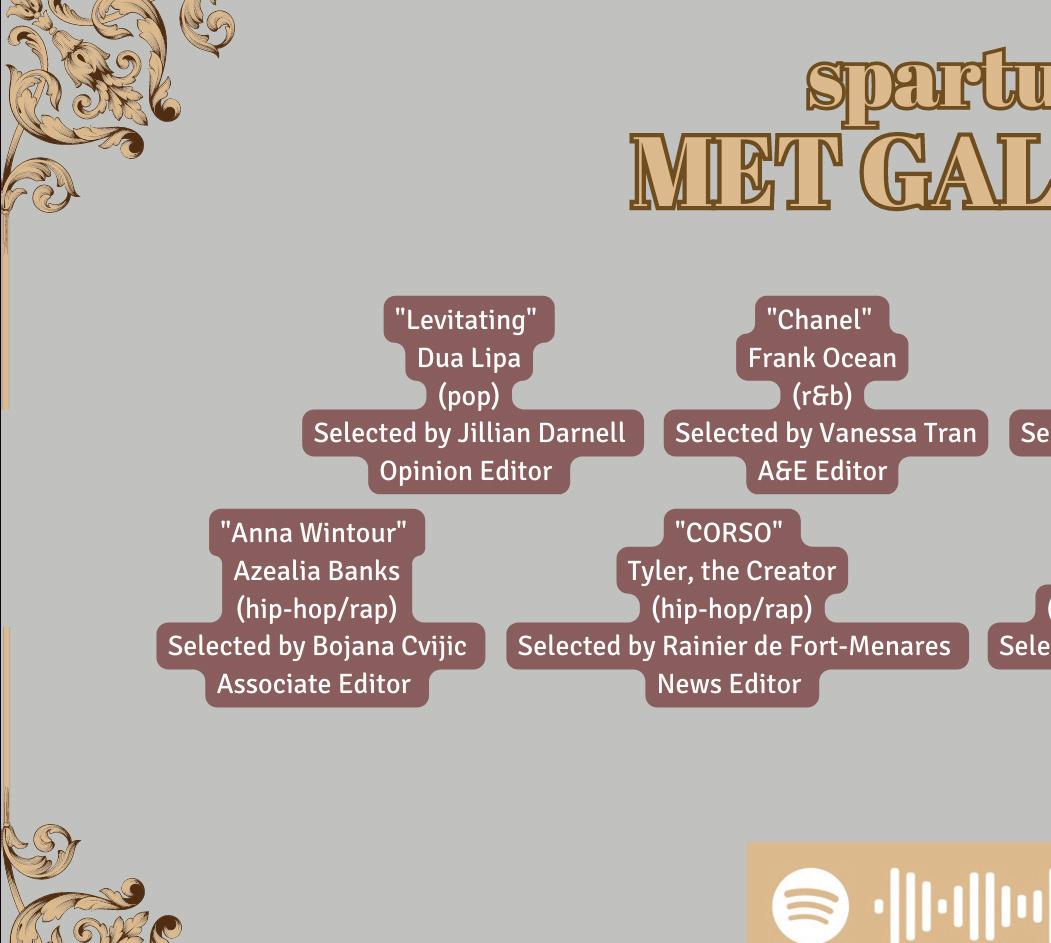

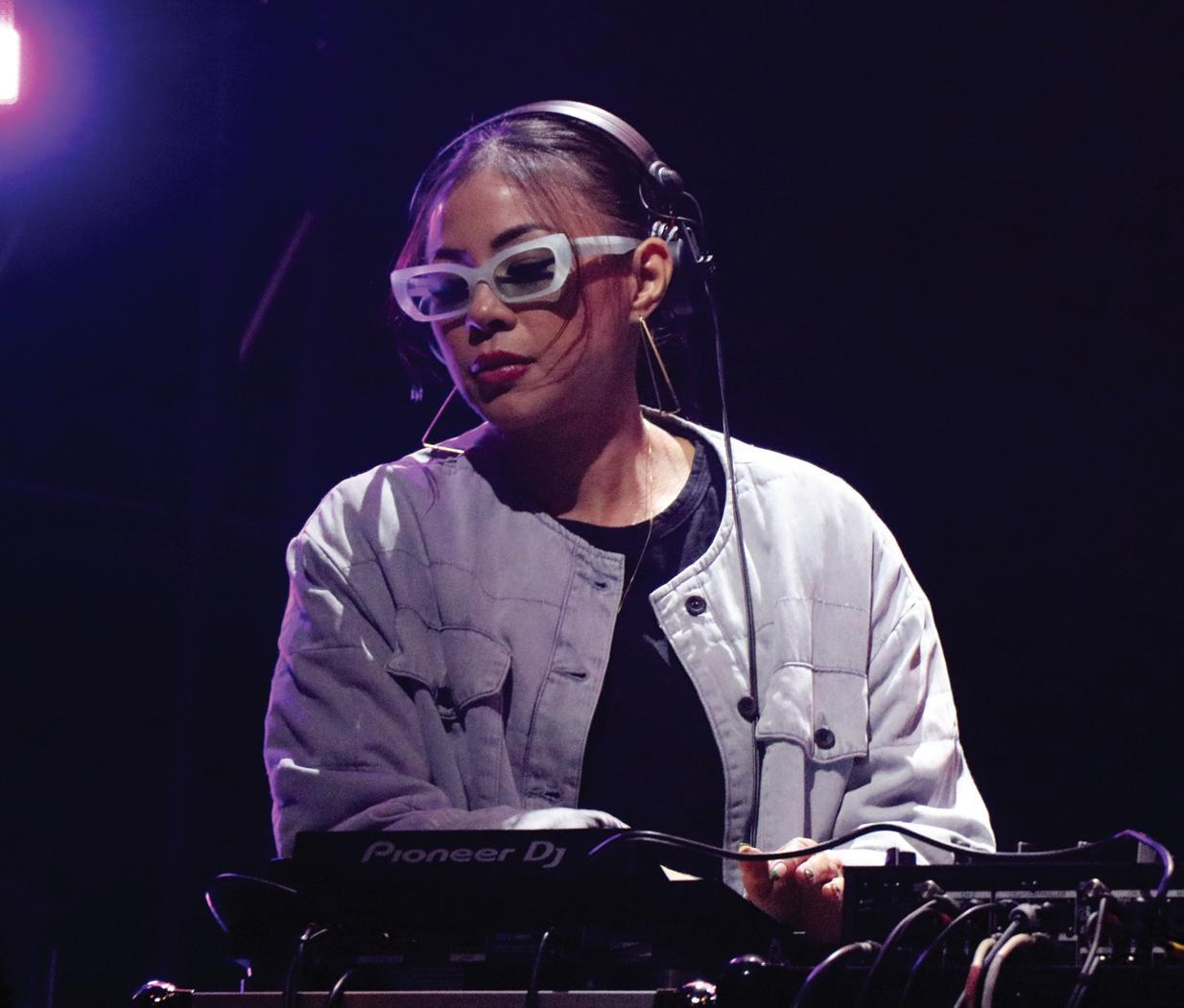
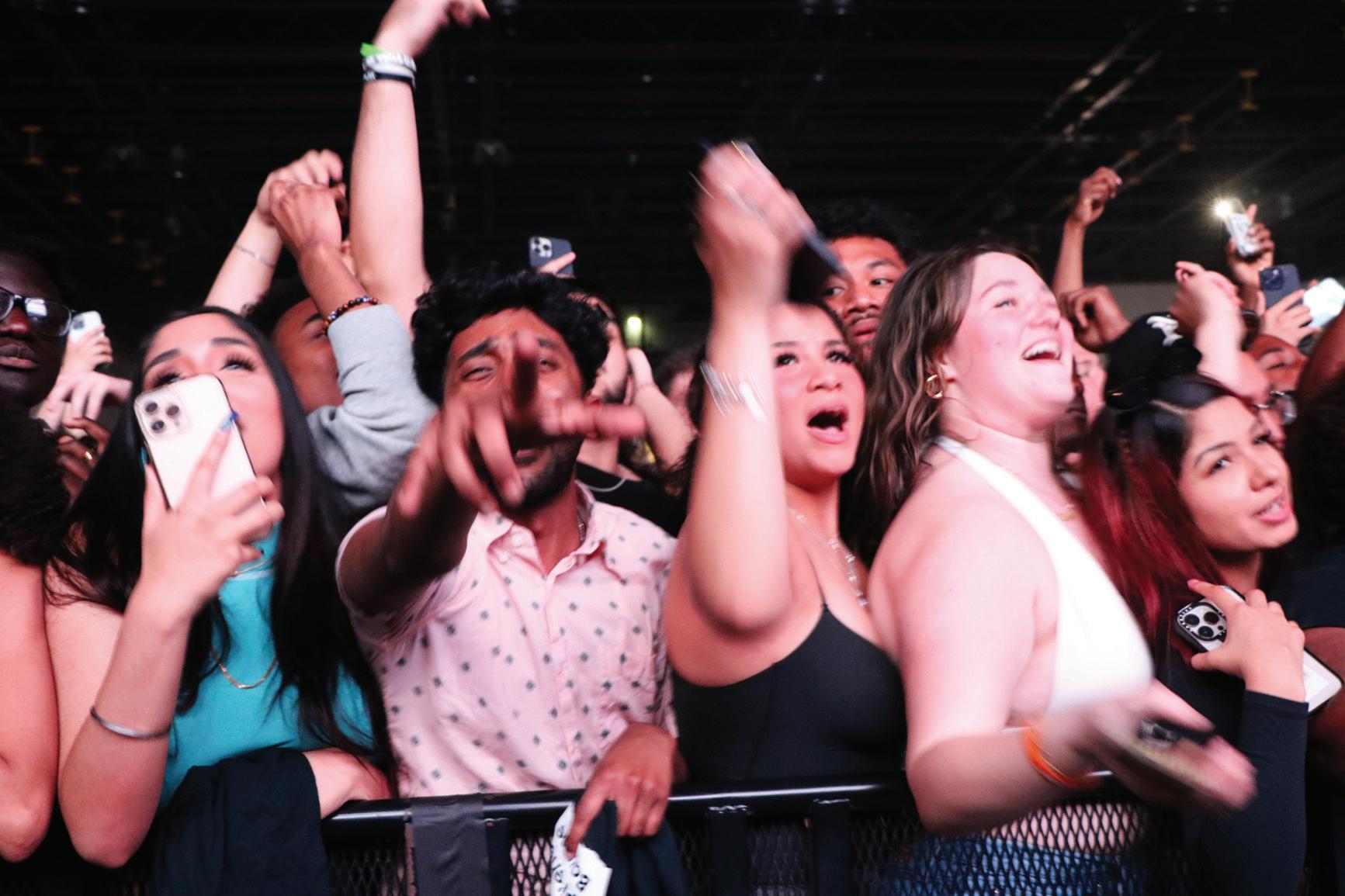



sjsunews.com/spartan_daily TUESDAY, MAY 2, 2023 ARTS & ENTERTAINMENT 6
1: Tee Grizzley performs at the Provident Credit Union Event Center on Friday night for SpartanFest.
2: DJ Umami hypes up the SpartanFest concert before headliners Tee Grizzley and Pi’erre Bourne come on stage.
3: Spartans sing along at barricade during Tee Grizzley’s set.
1 ALINA TA | S SPPAPAR AR ARTAN N DA DAILY LY ILY 2 3 4
|
DAILY GRAPHIC BY VANESSA TRAN
4: Pi’erre Bourne closes the concert and says goodnight to the crowd.
PHOTOS BY ENRIQUE GUTIERREZ-SEVILLA
SPARTAN
Cowboys draft Fehoko in 4th round
By Oscar Frias-Rivera SENIOR STAFF WRITER
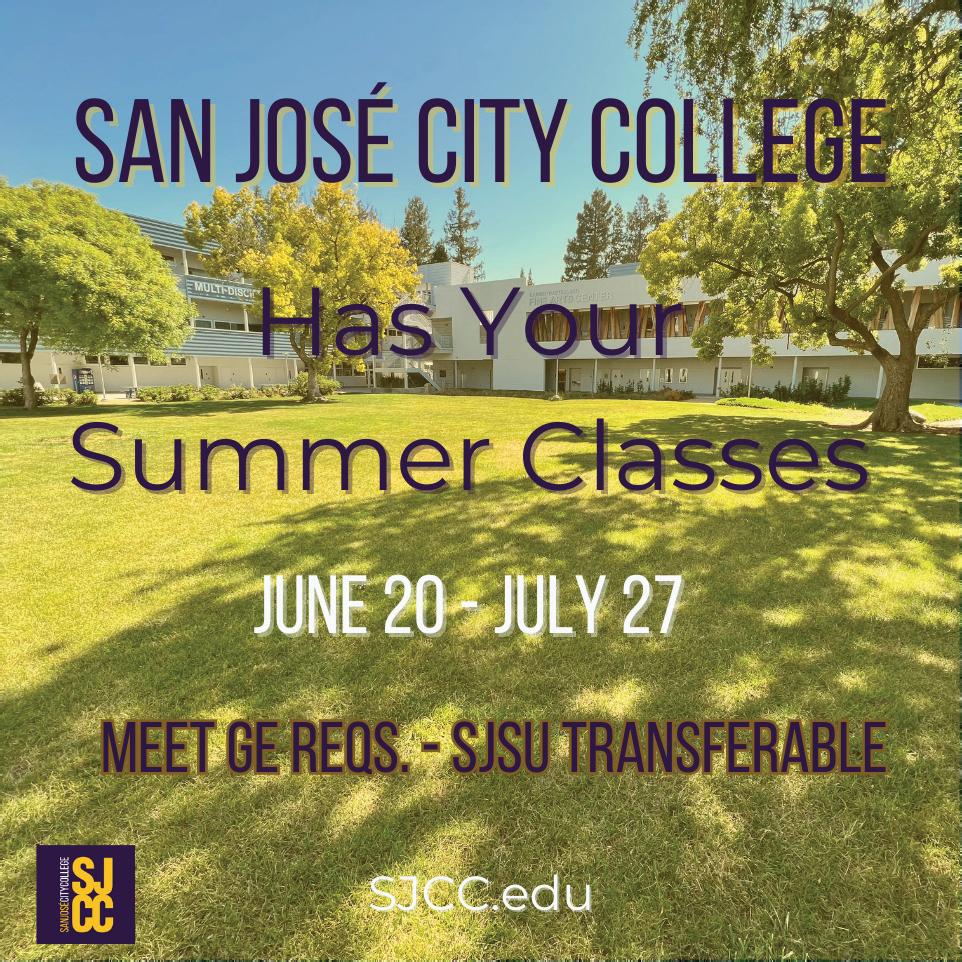
On Saturday, former San Jose State Defensive End Viliami Fehoko was selected by the Dallas Cowboys in the fourth round at pick 129 during the 2023 NFL Draft.

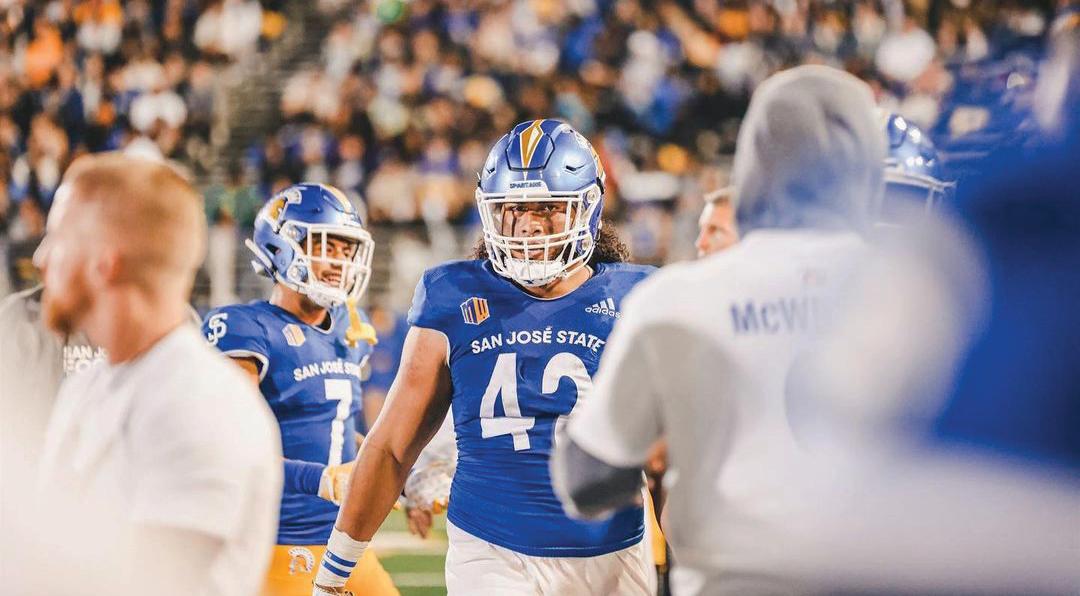
Fehoko led the Mountain West with 19 tackles for loss and was awarded the 2022 Mountain West Defensive Player of the Year. Fehoko is the first Spartan to be selected in the draft since former SJSU tight end Josh Oliver was selected by the Jacksonville Jaguars in 2019.
“We are so proud of Junior Fehoko and his journey and choosing a local kid and choosing to stay home developing our program,” said SJSU head coach Brent Brennan in a SJSU YouTube video.
He attended SJSU’s 2023 NFL Pro Day last month, where a record-breaking 45 scouts came out to see Fehoko participate in workouts.
Fehoko was chosen for the Sporting News All America Second Team and Pro Football Focus All America Second Team in 2022.
Teammates of Fehoko gathered on Saturday where they watched the Cowboys select the defensive tackle from Palo Alto native get drafted.
“Everyone here at Spartan football was going crazy when it got announced like the whole building erupted! It was a really cool moment,” Brennan said.
Fehoko finished his career at SJSU with 191 tackles, 46 tackles for loss, 23 sacks and 14 pass deflections in 48 career games.
He was fifth in the country with a career-high 19 tackles for loss and 17th in the country with a career-high 9 sacks
for the 2022 season.
Fehoko is second in SJSU history in tackles for a loss, eighth in single season tackles for a loss and fifth in career sacks.
He joins a Cowboys’ defensive line that includes Micah Parsons and DeMarcus Lawrence, both who were named to the Pro Bowl this past season.
“Everybody in the Bay Area is proud of him and the Dallas Cowboys got an incredible competitor, playmaker and one of the most fun people to be around,” Brennan said in the same video. “Today is a great day for Junior and SJSU.”
FOOTBALL
PHOTOS COURTESY OF SJSU ATHLETICS INSTAGRAM
sjsunews.com/spartan_daily TUESDAY, MAY 2, 2023 SPORTS 7
Follow Oscar Frias-Rivera on Twitter @oscar_frias408
SJSU forward Viliami Fehoko, who got drafted by Dallas Cowboys, celebrates after a game earlier this year at CEFCU Stadium


















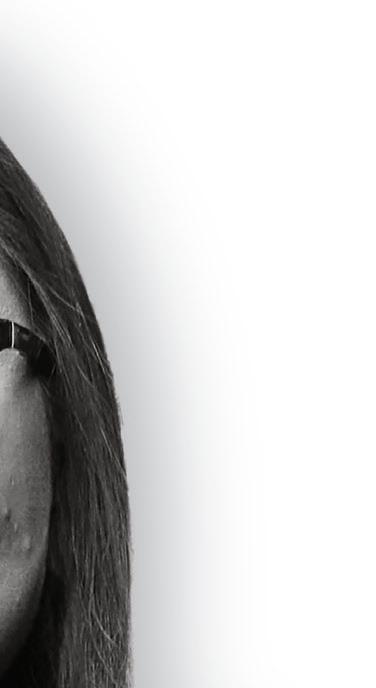

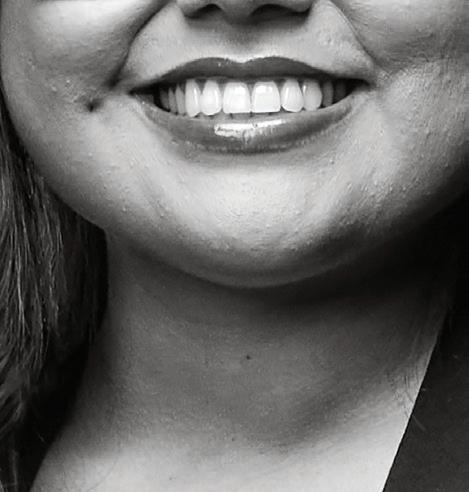
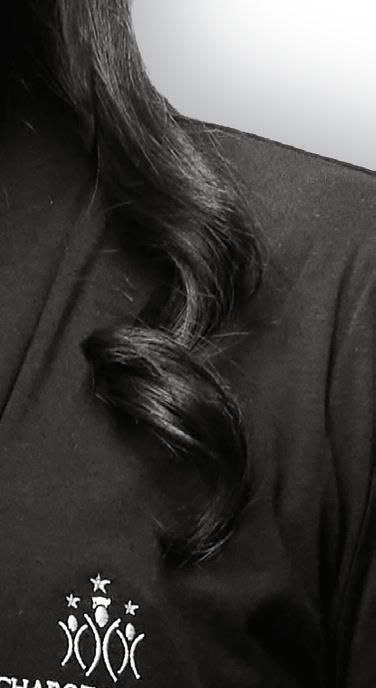
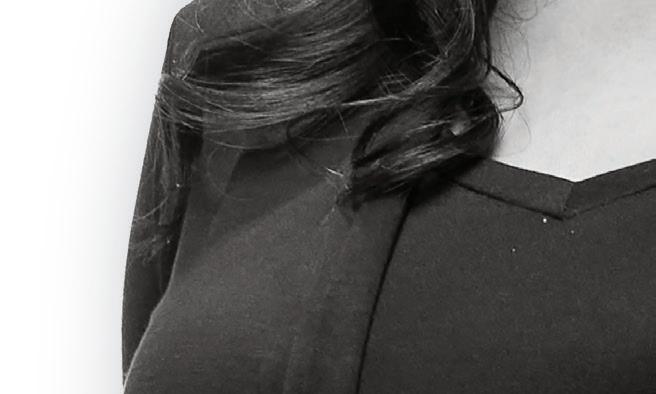
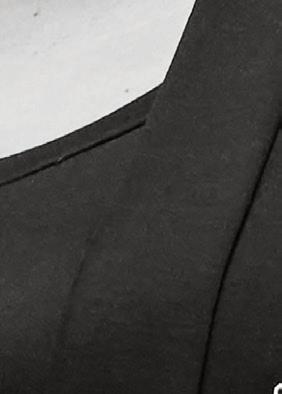















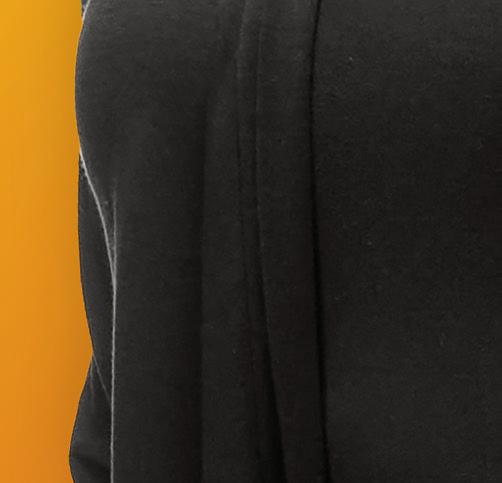


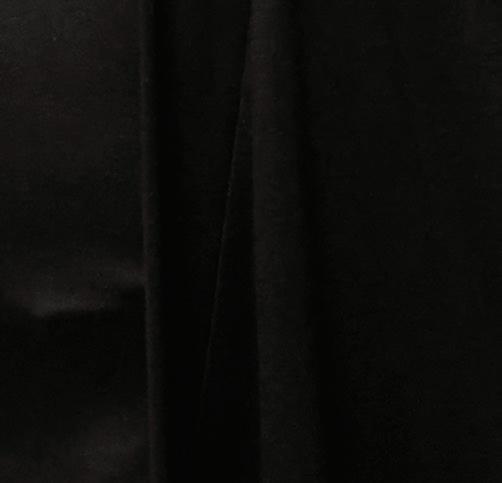



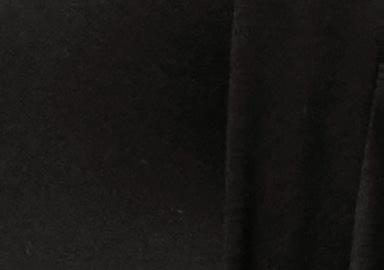

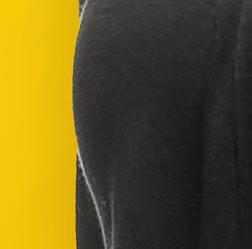



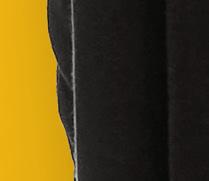






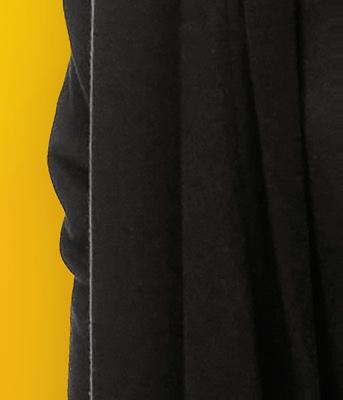


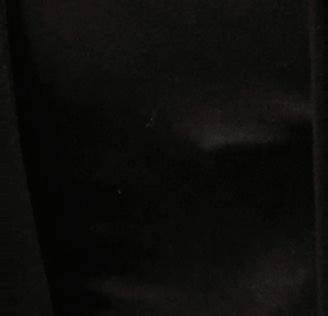



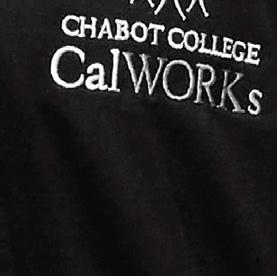














Save money and finish faster by taking summer classes. Summer classes are shorter, flexible, and affordable. APPLY TODAY chabotcollege.edu/welcome | (510) 274-1550 sjsunews.com/spartan_daily TUESDAY, MAY 2, 2023 ADVERTISEMENT 8







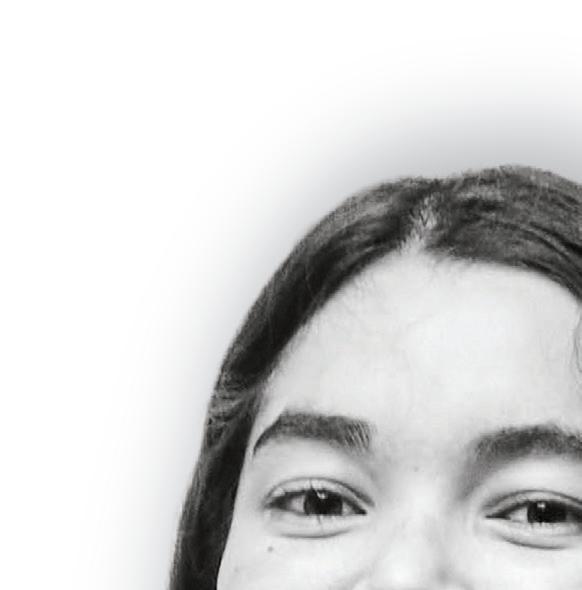
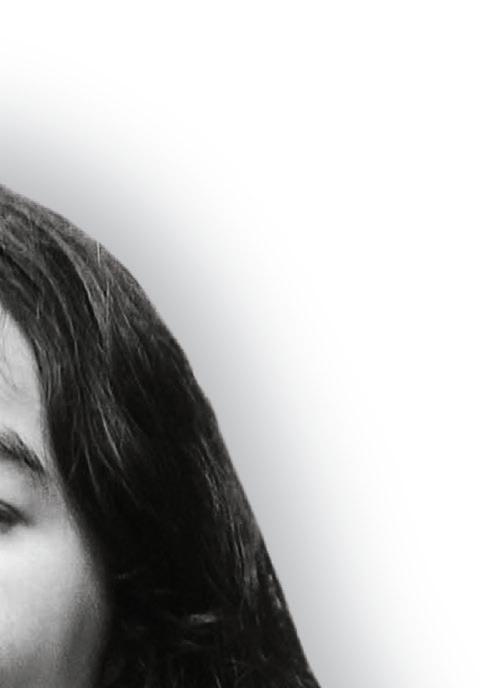

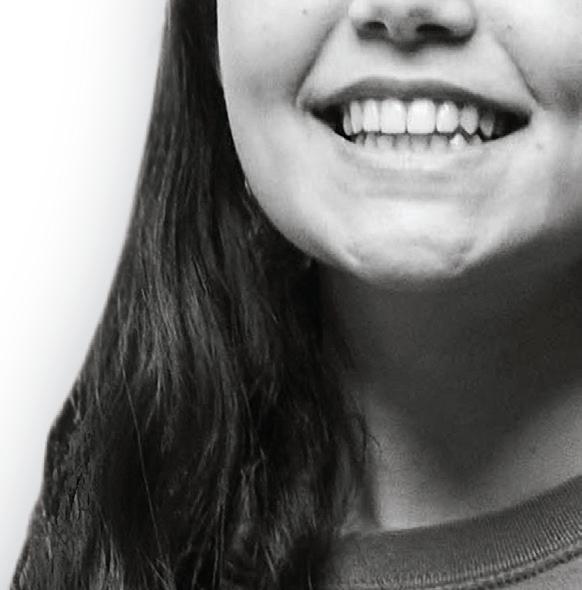
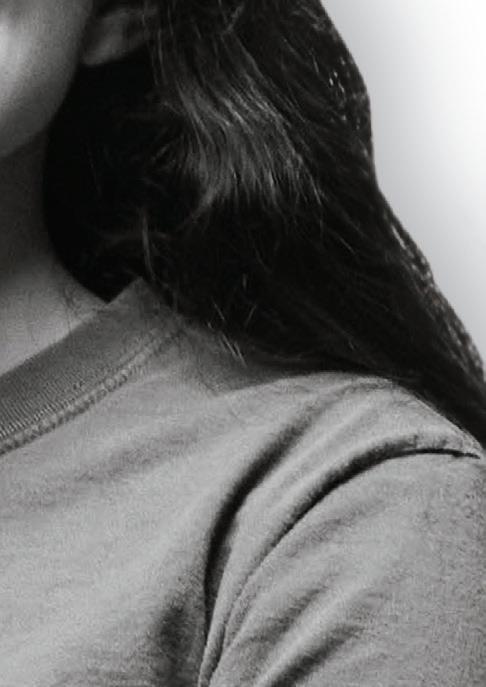














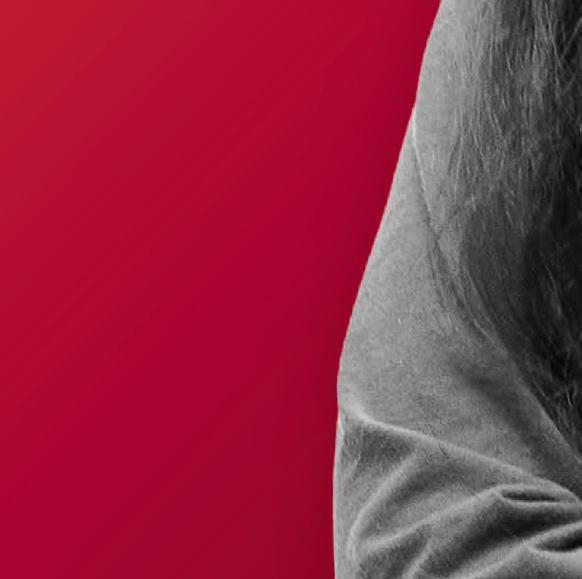
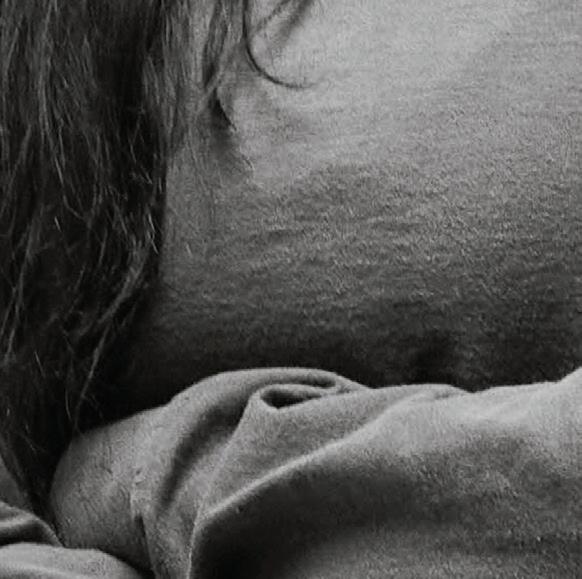
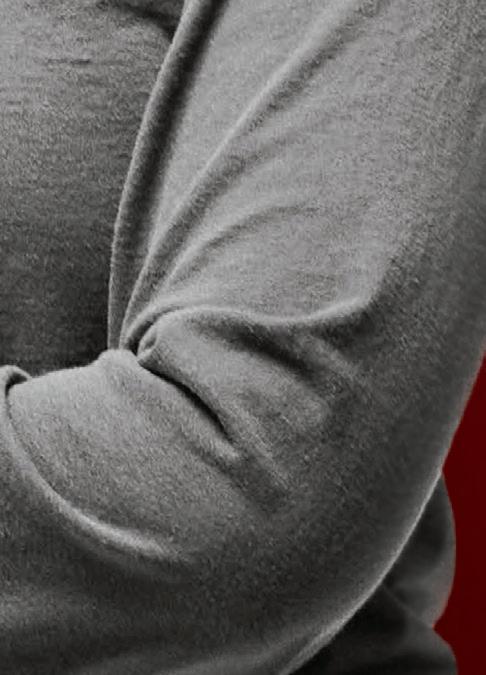





















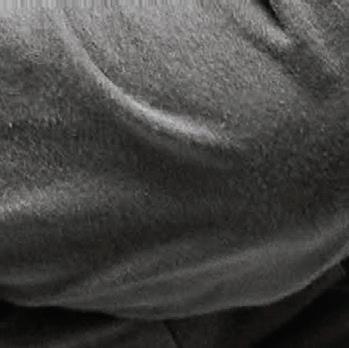








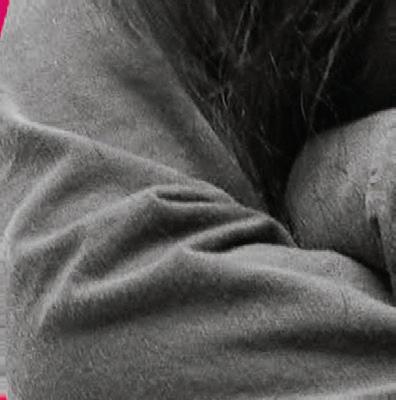


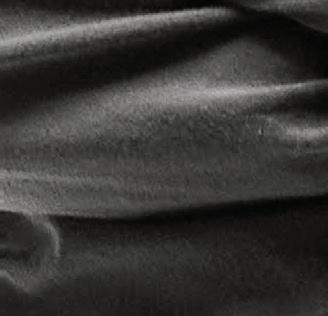



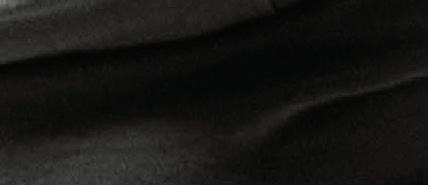

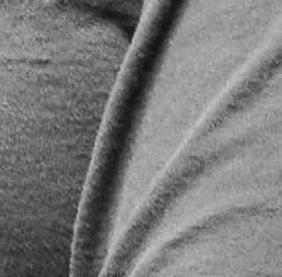























laspositascollege.edu/welcome | (925) 424-1602 Save money and finish faster by taking summer classes. Summer classes are shorter, flexible, and affordable. APPLY TODAY sjsunews.com/spartan_daily TUESDAY, MAY 2, 2023 ADVERTISEMENT 9





 By Brandon Nicolas STAFF WRITER
By Brandon Nicolas STAFF WRITER



































































































































